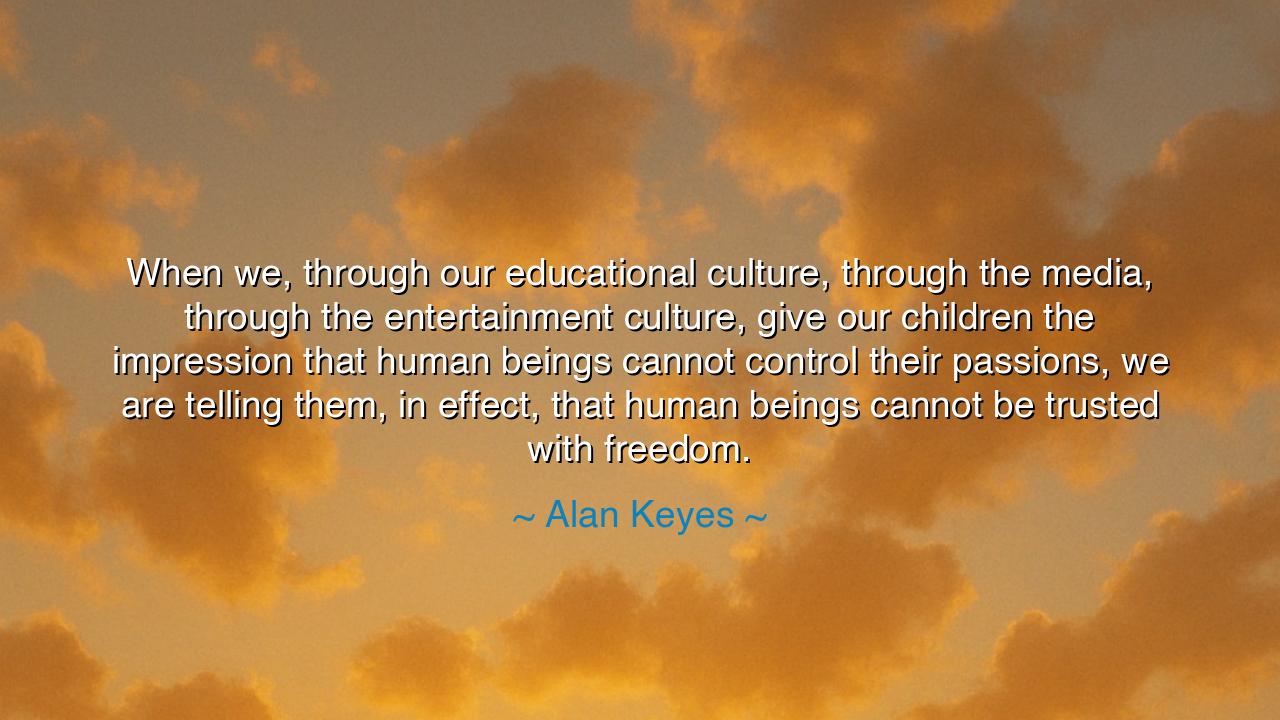
When we, through our educational culture, through the media
When we, through our educational culture, through the media, through the entertainment culture, give our children the impression that human beings cannot control their passions, we are telling them, in effect, that human beings cannot be trusted with freedom.






Hear, O seeker of wisdom, the solemn words of Alan Keyes: “When we, through our educational culture, through the media, through the entertainment culture, give our children the impression that human beings cannot control their passions, we are telling them, in effect, that human beings cannot be trusted with freedom.” This is no idle warning, but a cry from the depths of civilization’s struggle. For it reminds us that liberty is not sustained by chains upon the body, but by discipline within the soul. If men and women are taught that their desires are masters they cannot resist, then freedom itself becomes a weapon of ruin rather than a blessing of life.
The origin of this wisdom lies in the timeless bond between self-mastery and liberty. From the earliest days of philosophy, sages declared that freedom without virtue collapses into slavery of another kind—the slavery of appetites. Plato warned that a city of men without discipline would soon fall to tyranny. The Stoics taught that true liberty is found in mastering one’s passions, not in being mastered by them. Keyes, speaking in the modern age, points to the forces of education, media, and entertainment, which often celebrate indulgence and mock restraint. He warns that such teaching corrodes the very foundation of freedom, for a people who cannot govern themselves cannot long be free.
The ancients bore witness to this truth in their rise and fall. Consider Rome, once mighty and disciplined. In its early days, Roman citizens were famed for their austerity, their self-control, their devotion to the common good. But as centuries passed, indulgence overtook virtue. The arenas were filled with spectacle, the people clamored for bread and games, and passion became their ruler. When discipline was lost, freedom perished, and emperors ruled in place of the Republic. Here we see the eternal lesson: a nation that teaches its children that passion cannot be controlled also teaches them that freedom cannot be trusted.
History also offers us the tale of the American Founding. The architects of that republic spoke often of virtue as the guardian of liberty. George Washington declared that “virtue or morality is a necessary spring of popular government.” John Adams proclaimed that the Constitution was made only for a moral and religious people and would fail for any other. They knew that a free society depends not only on laws but on the character of its citizens. If people govern themselves inwardly, freedom flourishes; if not, freedom withers and chaos gives birth to tyranny.
Keyes’s words also carry a warning for our own age. When children are taught through stories, songs, and images that indulgence is normal and that self-restraint is foolish, they come to believe that freedom means doing whatever one desires. But this is a lie. For unbridled desire leads to ruin, both for the individual and the society. A drunkard may claim freedom, but he is bound by the bottle. A people addicted to violence or pleasure may claim liberty, but they are already slaves to their passions. True freedom is not the absence of limits, but the presence of self-control.
The lesson is clear: if we wish to preserve liberty for future generations, we must teach them discipline, temperance, and the nobility of self-mastery. A free people must be capable of saying no to themselves, as well as to tyrants. Parents, teachers, artists, and leaders alike bear the duty of showing that human beings can govern their passions, and thus are worthy of governing themselves. Without this teaching, freedom will dissolve into chaos, and chaos into tyranny.
Practical wisdom flows from this. Let your household be a school of self-control. Teach your children to discipline their desires, to work before play, to listen before speaking, to forgive before striking. Let your community honor those who live with integrity more than those who indulge in scandal. Let the voices of media and entertainment be balanced by voices of virtue and truth. In this way, society will raise up men and women who are not slaves of passion but stewards of liberty.
So remember Alan Keyes’s cry: if we tell our children that passion cannot be mastered, we tell them that freedom cannot be trusted. Reject this falsehood, and teach instead the ancient truth: that true liberty flows only from self-mastery. For a people who govern themselves with wisdom need no tyrant to rule them. But a people who refuse discipline will always find chains upon their hands. The defense of freedom begins not in parliaments or armies, but in the human heart that dares to master itself.






AAdministratorAdministrator
Welcome, honored guests. Please leave a comment, we will respond soon